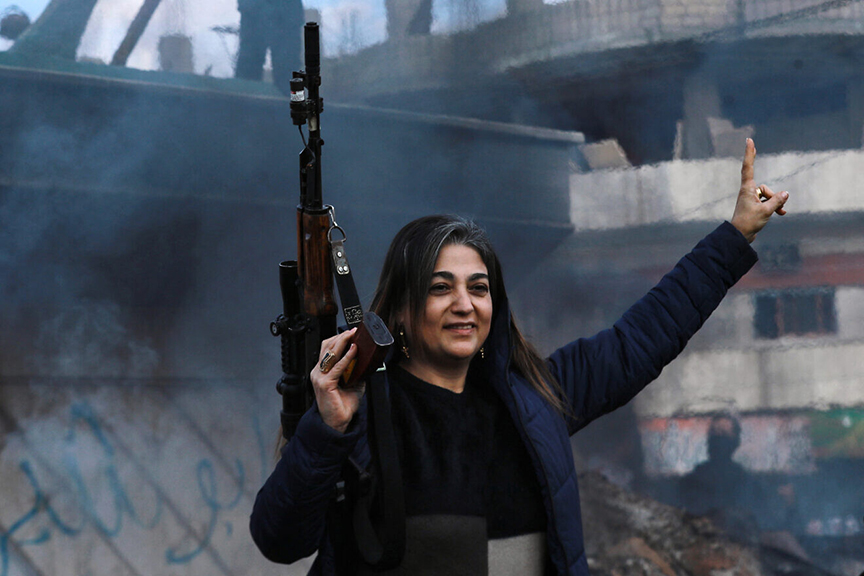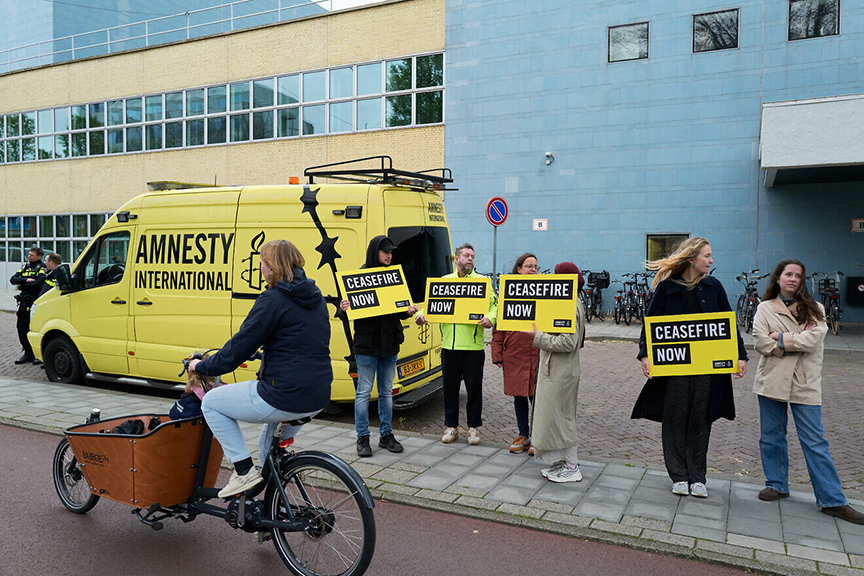Iranians and Israelis observing Memorial Day together

by Marziyeh Amirizadeh and Jonathan Feldstein
We could not be more different, coming from different backgrounds, but over the past year have learned a tremendous amount about where we each come from, and share a vision for a meaningful and hopeful future. This is particularly poignant this Memorial Day.
Marzi, an Iranian-born woman who became a Chrisitan in Iran and was arrested, imprisoned, and sentenced to death, is now a respected author and popular speaker. Jonathan, an Orthodox Jewish American Israeli dual citizen, moved to Israel 20 years ago, works to build bridges between Jews and Christians and Christians with Israel, and is host of the Inspiration from Zion podcast.
We were introduced through a mutual friend and Marzi was hosted on Jonathan’s podcast in February 2023. We met in person on Marzi’s first visit to Israel, a spiritual pilgrimage in every way, building upon her foundation of love for Israel and the Jewish people. Marzi had never met an Orthodox Jew. She came to Israel with a message that resonated widely: that Israel and the Jewish people have the same enemy as the Iranian people in the Islamic regime. She brought a message of hope and love that soon, the Islamic regime would end, either by act of God or popular revolution, and the once friendly ties between Israel and Iran would be restored and flourish.
As much as we are so completely different, we do have important things in common. First that we are both proud Americans, and deeply concerned for America’s future, specifically regarding its policies regarding the Islamic regime, and the regime’s infiltration into U.S. politics and wider society. And we look forward to celebrating the downfall of the Islamic regime, in Tehran.
As Americans we’re both aware of the significance of Memorial Day. Of course many Americans have suffered from war and terror. Yet unlike most Israelis and Iranians, most Americans have not suffered loss from war and terror, so most Americans don’t really contemplate what Memorial Day really is or ought to be about. Rather than a long holiday weekend, beginning of summer, and occasion for sales and barbeques, and wishes of “Happy Memorial Day,” Memorial Day is and ought to be a solemn day.
During Marzi’s visit to Israel, three members of the Dee family, neighbors of Jonathan, were murdered by Palestinian Arab terrorists. Driving to a commemoration of Holocaust Memorial Day, we were stuck in traffic nearby the site of another terrorist attack near Jonathan’s home.
The Hamas massacre in Israel on October 7 and subsequent war resonated with us both, with Marzi aware of and grieving for those murdered and kidnapped at the hands of one of the Islamic regime’s proxies, and Jonathan experiencing national stress and personal fear daily with a son and son-in-law called up to military service. We both had many sleepless nights.
Memorial Day in Israel is indeed a solemn day, observed the day immediately preceding Independence Day. The message is clear: that without the sacrifices of Memorial Day, 76 years of independence may not be possible. Restaurants and entertainment are closed. TV and radio broadcasts are all related to wars and terror that Israel has suffered, the victims, the heroes. This year, with over 1500 people killed since Marzi’s first visit to Israel, in the midst of a war with tens of thousands grieving and injured, Memorial Day was a particularly gut-wrenching period.
With Israel mourning over 30,000 people, few Israelis are not touched by the losses. We are keenly aware that sacrificing so many is a high price to maintain independence. We also know that had the 1979 Iranian revolution not taken place, Israel and the rest of the world would have suffered many fewer deaths. Simply, the Islamic regime and its proxy tentacles are the single biggest supporter and exporter of terror in the world, and it is not just Israelis who have suffered. The Islamic regime’s victims include a long global list not restricted to Israel and the Middle East.
In praying for the end of the Islamic regime and its evil influence around the world, we are also aware that millions of Iranians have suffered at the hands of the ayatollahs. Marzi knows that all too well from harrowing personal experience, and has written about that in her two books (available at www.MarzisJourney.com). Not only did she suffer personally, and lose loved ones as victims of the Islamic regime, she encountered countless Iranians who have suffered as the regime’s victims as well.
In the wake of the death of Iranian president Raisi, known as the Butcher of Tehran, Iranians and Israelis are celebrating divine justice, and praying that this is the beginning of the end of the regime, an opportunity for Iranians to take back their country from the Islamists who hijacked it 45 years ago.
In the spirit of, and with prayers for, reconciliation between Iran and Israel, it’s also our dream that Iranians learn from Israel’s tragic experience of a century of loss and suffering. When the regime falls and Iranians are able to build their own free society, this will be very important. We hope that when free, Iranians will establish a proper Memorial Day for the countless victims of the regime. This will be important for all the families of those who have been murdered by the regime, to have closure and be able to mourn without fear of being persecuted and arrested, or even murdered themselves. In this regard, Iranians can learn from how Israel commemorates Memorial Day, and we pray that alone will foster elements of reconciliation.
If Iranians also infuse this observance of Memorial Day with the awareness that there are also countless victims of the Islamic regime in Israel and around the world, it would go a long way to rebuilding relationships between Iran and Israel, and Iranians and Jews. We pray that this will be a foundation to restore relations, as societies free from the threats of the evil that has victimized both our people.
We pray that the vision of peace, restoration of warm relations, and genuine love will become the new way Iranians and Israelis will live together, and that we are able to be examples of that to our respective people.
Marziyeh Amirizadeh is an Iranian-American who immigrated to the US after being sentenced to death in Iran for the crime of converting to Christianity. She endured months of mental and physical hardships and intense interrogation. She is author of two books (the latest, A Love Journey with God), public speaker, and activist for religious freedom. She has shared her inspiring story throughout the United States and around the world, to bring awareness about the ongoing human rights violations and persecution of women and religious minorities in Iran. Details about her background, books, and speaking engagements are available at www.MarzisJourney.com.
Jonathan Feldstein was born and educated in the U.S. and immigrated to Israel in 2004. He is married and the father of six, and a growing number of grandchildren. He has become a respected bridge between Jews and Christians and serves as president of the Genesis 123 Foundation, www.Genesis123.co, and recently published a stunning book, “Israel the Miracle,” featuring 75 essays by Christian leaders around the world writing why Israel is so significant. He writes regularly on major Christian websites around the world about Israel, sharing unique experiences of living as an Orthodox Jew in Israel. He is host of the popular Inspiration from Zion podcast. He can be reached at firstpersonisrael@gmail.com.



